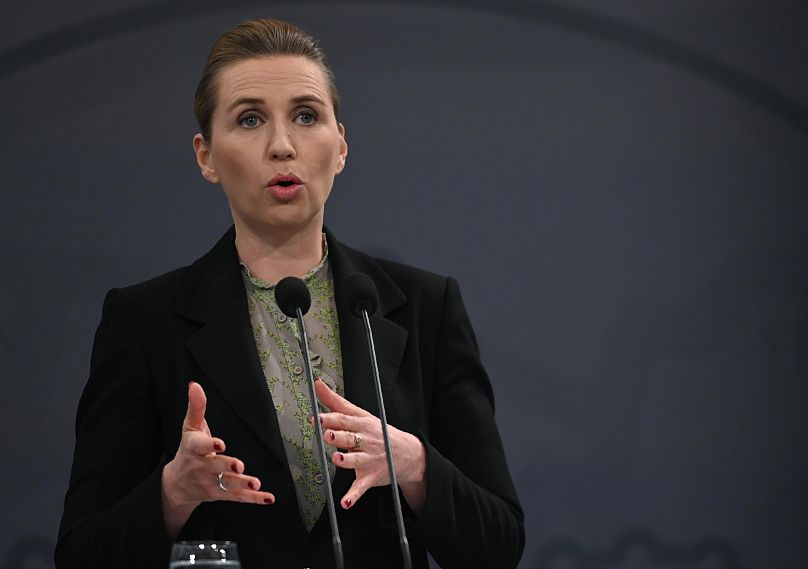Ahmad Zanon on the mental strain of being a refugee in Denmark at the moment.
When Ahmad Zanon joined his family in Denmark in 2015, he adapted to his surroundings and learned to like his new country, language and life — all despite the sadness of what he was forced to leave behind.
 ADVERTISEMENT
ADVERTISEMENT
 ADVERTISEMENT
ADVERTISEMENT
Six years - and half a Danish law degree - later, however, and Ahmad's life has once again been turned upside down.
The 24-year-old is one of more than 200 Syrian refugees who face having their residency permits revoked after the Danish government deemed Damascus and the surrounding area safe — a move widely condemned on the international stage.
For Ahmad, this has also become a personal battle with the mental distress of forcing his own and his family's lives into another upheaval.
"I can't emphasise how hard it is, I just cannot emphasise," he told Euronews over the phone from his home in Skærbæk, a town close to the border with Germany.
"You can't imagine how much it takes a toll on the mental health of someone who considers himself the bearer of responsibility in his family.
"This makes me feel like I want to give up - but alhamdulillah."
Ahmad is by far not alone. Research has uncovered different types of mental distress among refugee populations: one that occurs pre-migration, such as a specific warzone trauma; and another that comes as a result of poor social integration in host countries.
One piece of research from the UK-based Syria Relief charity found as many as three-quarters of Syrian refugees living in Turkey and Lebanon exhibited symptoms of post-traumatic stress disorder (PTSD), an anxiety disorder brought on by traumatic events.
Common symptoms of PTSD can include flashbacks and nightmares in which a person essentially re-lives a distressing incident; avoidance and emotional numbing; feeling 'on edge', and irritability. It can also develop into depression, anxiety and issues with substance abuse.
"The data implies that being exposed to life-threatening events, especially at a young age, will mean you are more likely to develop PTSD symptoms," said Charles Lawley, the head of communications and advocacy at Syria Relief.
Writing to Euronews via email, he added: "For refugees, there are added traumatic events — living in camps is very dangerous and usually involves extremely desperate levels of poverty, the journey is often treacherous, traumatic and life-threatening, especially for those who have had to travel long distances or cross seas on the journey — like many of those in Europe have had to."
In Ahmad's case, the upheaval from Syria's warzone was complete. He had arrived in Denmark - where his Iraqi grandfather had lived as a political refugee since 2000 - learned fluent Danish, and started again with law school. But now his future is uncertain once more.
"It's almost harder - mentally - than war," Ahmad said. "When in war, you have hope that you'll get out of it, right? You have hope that it'll be over with. But when you're living peacefully and they want to send you back to war, to think about that, it is harder.
"Your life, your friends, everything; you just can't leave it behind this fast. Also, when you process all this, you find yourself not getting any sleep — I sleep maybe two or three hours a night, not more. Even when I don't want to think about it, it just hits me."
At present, Danish authorities will not repatriate Syrians with revoked permits, due to a lack of diplomatic ties between the nations. They will, however, require these refugees to live in an asylum centre should they not return to Syria voluntarily.
"They can't work and they will not have legal residence," said the Danish Refugee Council's asylum department director Eva Singer. She stressed that while some Syrians have returned of their own accord, this was a "small number".
"There might be bombs falling in Damascus, but the real issue is that people are afraid of what will happen in the point of view of Syrian authorities... the risk of being detained is quite large. You can't predict who might get into trouble."
Ahmad's reason for leaving Syria was to avoid being drafted into national service upon turning 18. "I wanted to continue my studies, I didn't want to join the army, nor take part in the war.
"I didn't want to kill anyone and have blood on my hands. I didn't have any choice, I only had one option: I had to leave."
They told us to go to Iraq
According to Ahmad, who is from Qamishli, the Danish government has also gone a step further by requesting he and his family go to Iraq instead. He says this is due to his paternal grandfather's Iraqi roots, despite Ahmad, his father and his uncles all being born in Syria.
"My family - my mother, father and I - didn't go with my grandfather's family to Denmark in the year 2000 because the then Danish government considered us a Syrian family - because my mother is Syrian. So we stayed in Syria because there was no war back then.
"However, when the war began, we came to Denmark, and after more than five years here, they tell us that we're not Syrian - we're Iraqi. Why the contradiction?"
So, how much does the idea of going to Iraq worry Ahmad?
"A lot," he said. "I've never been to Iraq, not when I was younger, not when I was older. I've never seen Iraq and all I ever heard about Iraq was that there's an ongoing war, so now the idea of them bringing me back to war is not very easy [...]
"It's dangerous because my grandfather was politically affiliated back in Iraq and the government there is not like European governments; they won't overlook the fact that he was a political refugee.
"You never know, if we go back, we could go to prison."
What is Denmark doing?
Such a policy in Denmark is nothing new. The northern European nation has slowly tightened its immigration rules over the years — and Prime Minister Mette Frederiksen is simply delivering on her election vision of "zero asylum seekers".
In early June, MPs also approved amendments to the Danish Aliens Act, authorising the government to send asylum seekers to reception centres in other countries - possibly outside Europe - while asylum claims are processed.
Euronews presented Ahmad's case to the Danish Immigration Ministry and the Danish Refugee Appeals Board; however, neither responded to our requests for comment.
Singer, meanwhile, said the policy against Syrian refugees like Ahmad was "a risk", and one that should "not be copied" by other European nations. "It would be the responsibility of the Danish government if people are persecuted against," she explained.
What's the best opportunity for reaching mental wellbeing?
"Every individual is different, and for people suffering from mental health issues, the need for each is different, but basic dignity and human rights is a good place to start," said Lawley. "Security is a good example.
"Refugees in Denmark, who have fled fearing for their lives living now in fear they will be forced to return to somewhere they and the whole world with an ounce of common sense know isn't safe, will certainly be having a terrible time.
"A place in society — a home, a job, the same rights as everyone. Access to health and mental health services are also really important for those who have fled a warzone."
Ahmad's future in Denmark is yet to be decided. He has hired a lawyer to appeal the government's decision to revoke his permit and is now waiting for a verdict.
"Depending on the verdict, we'll work and see what can be done... But I would ask the Danish government to practice some equality in the world and not be racist because racism is what led us here," said Ahmad, adding: "We're also human: fleeing a war.
"I did everything. I reached the highest level in the Danish language in just nine months when it should have taken around three years. I then started my studies all over again.
"When I was in Syria, I finished my first year of my law degree when I came to Denmark and had to start again from the beginning. I'm now halfway done with my law curriculum here in Denmark and I still have the other half to go.
"So what did I do for them to do this to me? For someone to build a new life from the ground up and to now see it all torn down."
Every weekday, Uncovering Europe brings you a European story that goes beyond the headlines. Download the Euronews app to get a daily alert for this and other breaking news notifications. It's available on Apple and Android devices.












